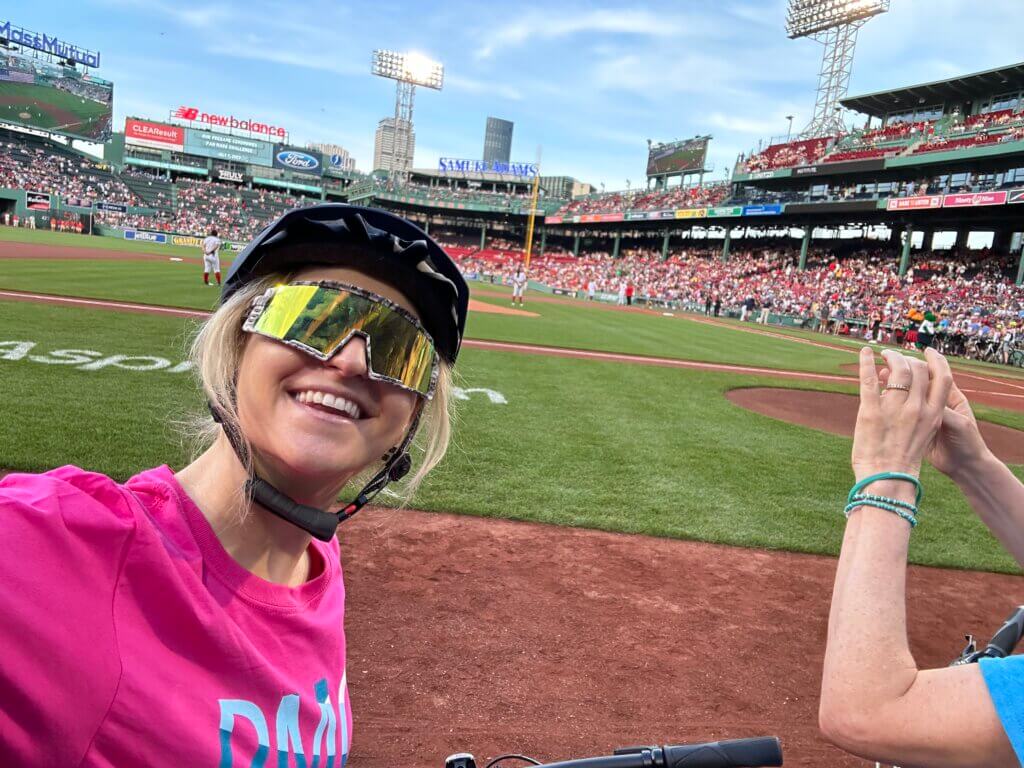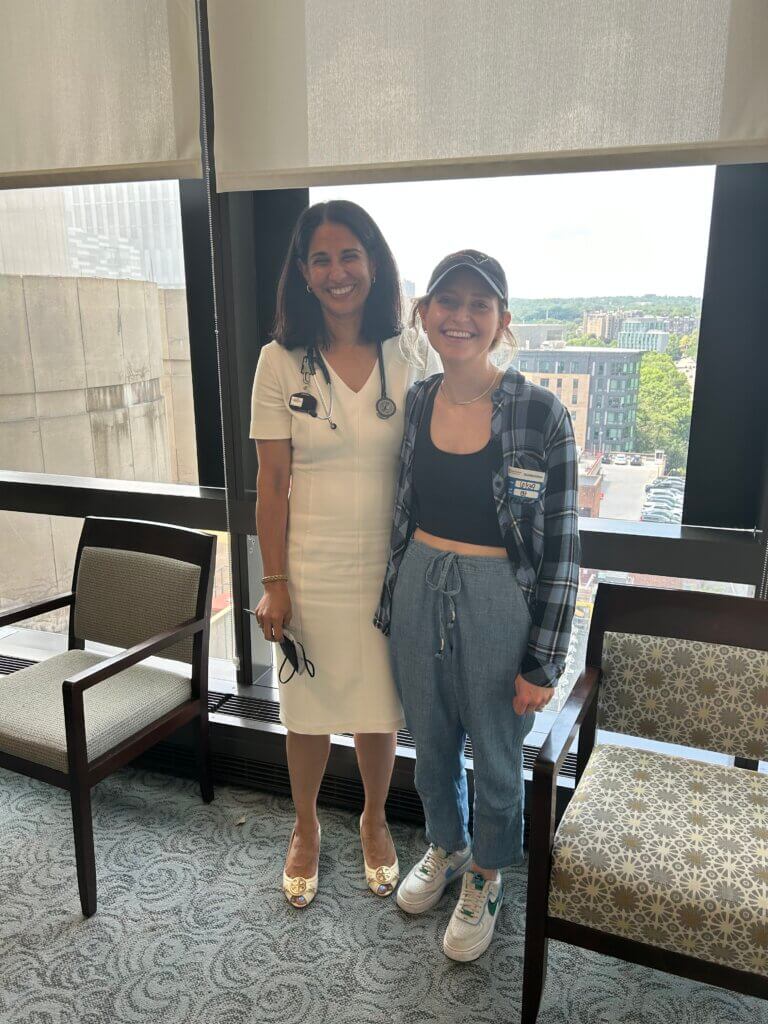The weather had thankfully cooled off in early August as Dena Ofengeim pedaled uphill into Lakeville, Mass. On the 60th mile of 162 of the Pan-Mass Challenge (PMC), a bike-a-thon raising funds for Dana-Farber, Ofengeim was worn out. But lining the road were photos of the PMC Pedal Partners — pediatric patients at the Jimmy Fund Clinic who are paired with PMC riders and teams — and Ofengeim, reminded of why she was biking, pushed forward.
“It was one hundred percent the hardest thing I’ve ever done,” Ofengeim says of the PMC. She laughs, “I didn’t really think through the fact that before I had cancer, if someone asked me to do a 5K, I would have laughed in their face.”
But she had come far in the last two years when a growth from metastatic breast cancer pressed on the nerves of her spine and made it impossible for her to walk. After treatment at Dana-Farber, Ofengeim was able to get on her bike, train with her friends, and complete the PMC, raising over $35,000 along the way. “It was the most gratifying and rewarding experience I’ve had,” she says.

A surprise diagnosis
In December 2021, Ofengeim, only 28 at the time, did not think of cancer when she began experiencing back pain. She instead blamed a job that had her sitting for most of the day.
She stuck with her primary care provider and did physical therapy, thinking that she had sciatica or, at worst, a herniated disc. It wasn’t until her pain spiked one day, and she began experiencing weakness in her legs, that she visited the emergency room.
Imaging revealed a mass pressing on her spine that would need surgery, and a biopsy showed that it was breast cancer which had spread. Once the mass on her spine was removed, Ofengeim had to use a wheelchair as she began the long process of regaining her mobility. She also had to face a breast cancer diagnosis.
“It was just, like, ‘no, I’m not here for that,’” she remembers.
Ofengeim was unaware of a family history of cancer. (Although later she would discover that her grandfather had died of breast cancer.) But being so young, it hadn’t occurred to her that she could be at risk. Just days prior, she was making plans to get married and enjoying a successful career in recruitment with a five-year plan in mind.
The days in the emergency room were a blur to her, filled with diagnostic tests and procedures. She wasn’t fully able to process the weight of her diagnosis until she met with Dana-Farber’s Chief of the Division of Breast Oncology, Sara Tolaney, MD.

Tailored treatment
Tolaney and her team discovered that Ofengeim’s cancer is hormone-receptor positive, meaning it uses estrogen or progesterone to grow. Research at Dana-Farber and elsewhere has found that their growth can be slowed or halted with hormone therapies that stop estrogen production.
After her back surgery and radiation, Ofengeim began treatment with hormone therapy. She is also being treated with a cyclin-dependent kinase 4 and 6 (CDK 4/6) inhibitor, a type of medication that disrupts the growth of certain types of breast cancers.
Tolaney remembers that Ofengeim’s improvement after treatment began was rapid. “It was remarkable,” she says. “It is amazing to see her back to her normal life after coming to me in a wheelchair.”
Giving back
Gratitude spurred Ofengeim to join an innovative trial that Tolaney offered. In the trial, researchers are monitoring patients for a mutation on a specific estrogen receptor, which is believed to cause resistance to endocrine therapy. Tolaney describes the mutation as a sign that the cancer may “outsmart” the drug. If that mutation develops, investigators believe it may be beneficial to switch the type of hormone drug being given in order to overcome resistance.
Ofengeim hopes her involvement in the trial will further progress towards new ways of treating advanced breast cancer. It’s a way of paying forward the lifesaving treatment discovered with the help of clinical trial participants of the past, she says. Those treatments made it possible for her to celebrate her marriage to her husband in 2021 and return to a full and active life.
“Over the last few years, we have seen FDA approvals for multiple new breast cancer agents,” Tolaney says. “It’s exciting to know that our patients have so many options.”
Through genetic testing, Tolaney also discovered that Ofengeim has a mutation in the BRCA gene, which is in charge of repairing DNA. At Dana-Farber’s Center for BRCA and Related Genes, Dana-Farber investigators are dedicated to researching interventions for this specific type of cancer and collaborating with oncologists to deliver them. Because of this discovery, Tolaney knows that Ofengeim may also benefit from a type of targeted drug called a PARP inhibitor, if her current regimen becomes ineffective.
“It’s reassuring to know that Dr. Tolaney and her team are on top of everything,” Ofengeim observes. “And that even if the cancer becomes resistant to treatment, there will be another option for me. I don’t have to worry.”
During recovery, Ofengeim celebrated the small wins: sitting on her bike for 10 minutes or walking her dog around the block at the home she shares with her husband in Jamaica Plain. Now that she is back to her full health, she celebrates every day that she has regained with a renewed focus on what matters: family, friendship, and giving back. That’s what drove her to raise funds for Dana-Farber research through the PMC.
“I will never be able to repay the gift that Dana Farber has given me,” she writes in her PMC “Why I Ride” post. “But I can at least give back some of my time and energy to help such an incredible place make even greater advancements and continue to lead the way in cancer treatment breakthroughs.”
